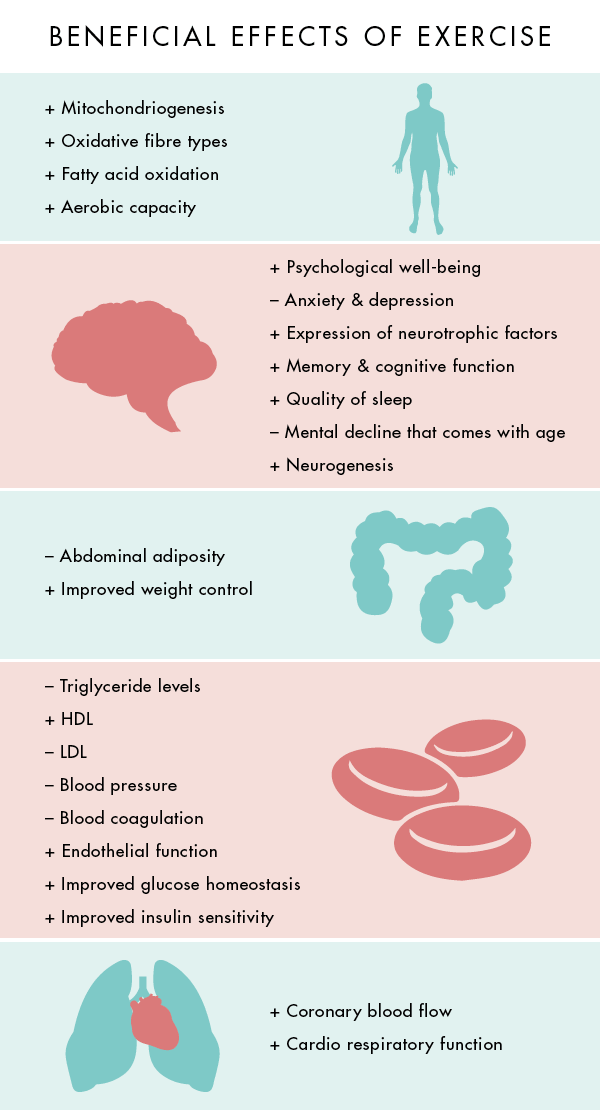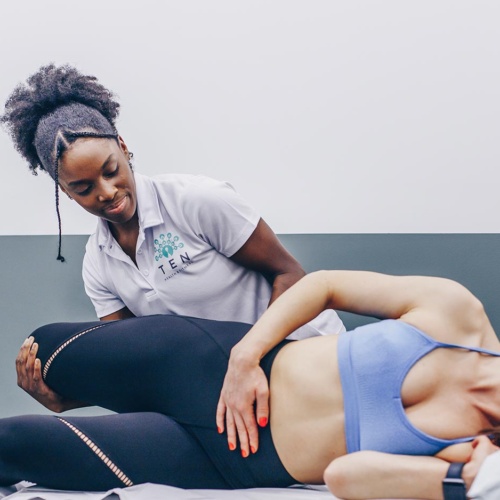Consider the following question; if you could take a pill that could potentially cure, manage and prevent the vast majority of chronic diseases and pain states that commonly affect human beings, would you do it?
And if that sounds like one of those theoretical ‘what if? questions, here’s the kicker. The pill already exists. It’s called exercise.
Think of it as a drug
A recent review published in the British Journal of Pharmacology (1) postulates a viewpoint that exercise should be considered a drug, due to the myriad of positive – and proven – health effects it confers.
As can be seen below, exercise can positively influence every single bodily system; not just the muscles or the heart, but also our neurological health and psychological well-being.

The effects of exercise in society are well established – even as far back as the Greek philosopher Plato (427-347BC) who said, “Lack of activity destroys the good condition of every human being while movement and methodical physical exercise saves and preserves it”.
However in modern society, even though we all know “exercise is good”, we have lost track of just how good it is.
Recommended dosage
So let’s break it down – exactly what dose of exercise (frequency, intensity and type) is the bare minimum required to have an effect?
Surprisingly little – latest evidence suggests it is manifestly attainable. Simply, 30 minutes of moderate exercise 5 days per week OR 75 minutes of vigorous exercise for the entire week. To put it in context, 75 minutes a week is half the amount of time the average Briton spends watching the adverts on TV. *
If that isn’t motivational enough, then how about this:
The benefits
It has been confirmed that those who exercise in line with the above guidelines, or above, can expect to have an increase in life expectancy of 15% compared to a non-active population. Furthermore, those who are physically active have a 20-35% reduction in risk of death compared to those who aren’t physically active. Exercise also exhibits what in medicine is called a “dose response”.
In short, the more you exercise the longer you will live. A theory proven by a recent study (2) showing that on average, elite athletes live longer, than the normal population, regardless of their chosen sport.
More specifically…
Specific conditions including chronic low back pain, diabetes, obesity, persistent pain, osteoporosis and high cholesterol (to name literally a fraction of the hundreds) are particularly sensitive to the positive effects of exercise.
The only truly scientifically based treatment for low back pain, which is considered to be now more costly to the NHS than cardiovascular disease, is exercise and strength and conditioning of several core muscle groups.
The first line of defence for diabetes and high cholesterol is now exercise and diet NOT medication.
Exercise including strength training and weight-bearing exercise is paramount at preventing and treating osteoporosis (thinning of the bones)
Exercise, especially aerobic exercise (where stored fat is the fuel that is burnt) is the only proven way to lose weight.
Exercise acts as a natural analgesic (pain reliever) by releasing endorphins that activate pleasure centres within the brain.
Finally, and I believe that amongst most important benefits of exercise, is the psychological effects. It is unequivocally proven that exercise improves memory and learning, improves our response to daily stress, counteracts the mental decline that comes with age, improves sleep and increases our level self worth and body image.
The drug health professionals recommend
The concept of exercise as medicine is gaining traction within the health fraternity, and as you can see from the evidence mentioned in this article, it is not hard to see why.
Exercise is a potent drug that works at a whole body level. Instead of being a walking pharmacy, consuming various anti-inflammatories for pain, statins for cholesterol and anti-depressants for a low mood, try exercise for 150 minutes per week and enjoy the positive effects it will immediately have.
For advice and guidance consult our physio’s or trainers who will happily formulate an individualised plan for you to reap the physiological rewards of exercise.
References:
1) Vina, J., Sanchis-Gomar, F., Martinez-Bello, V., and Gomez-Canrera, MC (2012). Exercise acts as a drug; the pharmacological benefits of exercise. British Journal of Pharmacology.
2) Lemez, S., Baker, J (2015). Do elite athletes live longer? A systematic review of mortality and longevity in elite athletes. Sports Med Open.
*Moderate exercise is defined as an increase in heart rate while still being able to hold a conversation, i.e. brisk walking, whereas vigorous exercise describes a further increase in heart rate, to the point where holding a conversation becomes more difficult, for example jogging.





